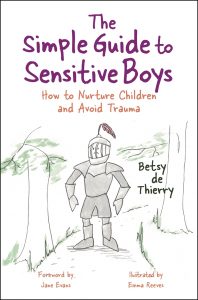 Betsy de Thierry talks about her her new book, The Simple Guide to Sensitive Boys, and discusses the need for society to stop imposing male stereotypes upon them about how they should behave.
Betsy de Thierry talks about her her new book, The Simple Guide to Sensitive Boys, and discusses the need for society to stop imposing male stereotypes upon them about how they should behave.
“The creative mind is wired with the ability to feel with great depth and passion. Without good strategies for managing this hypersensitivity, instead of creativity the result can be a plunge into the emotional depths.”[1]
Being male today seems to be complicated. We recognise the statistics that demonstrate the mental health struggle for many males in adulthood, and yet many environments are not recognising the challenges around being male in childhood. The link is important because I believe that we could prevent a lot of the mental health problems presenting themselves if we were able to meet the emotional needs of men at a young age.
In my new book, The Simple Guide to Sensitive Boys: How to Nurture Children and Avoid Trauma, I assert that boys are becoming traumatised by the expectation on them to be male in the assertive, ‘macho’ way that our society defines. Bullying of those who do not conform to this stereotype is at an all-time high, and this issue is exacerbated by television, social media and the 24/7 access to it which young people enjoy. All around, young people are being subjected to a permanent picture of what ‘manliness’ entails on the likes of Facebook and Instagram, causing those who do not quite fit this description to feel at odds with the world and to become an easy target.
As a mother of four sons and practising psychotherapist, I have found that across the UK and beyond there is a clear hierarchy of popularity in most schools. Children as young as five can often communicate where they fit on that ladder. The boys who excel at sports are usually the most popular, confident and happy, whilst those who are sensitive, creative, caring and intuitive can find the school experience terrifying and overwhelming. They often find themselves in the difficult position of either sacrificing their individuality to conform and be popular, or staying true to their uniqueness and risk being bullied.
Parents and other adults need to be able to identify and articulate what a sensitive boy is and how they are essential for a healthy society. When they can articulate this with confidence then the child can be better prepared to articulate their sense of self to others and therefore have the resilience they need to enjoy life and be confident in their skills and strengths.
When parents communicate strongly- either explicitly or implicitly that they want their son to conform to the expectations that society has for boys – this can result in the child ultimately feeling rejected for who they actually are, and they can often hide their interests, feelings and skills as a result. This can easily lead to depression and anxiety as they feel alone, isolated, misunderstood and rejected.
The way that many boys survive the unrelenting confusion of being a creative, empathetic, deeply feeling boy is to utilise some coping mechanisms which are helpful in the short term but become limiting in the medium term. Coping mechanisms could be things like the subconscious decision to shut down feelings, passions or interests, or withdrawing socially to avoid the sense of confusion, or becoming aggressive or angry to feel more powerful when the vulnerability of being sensitive is too painful. These limit the child’s ability to make sense of life and can cause deep subconscious feelings of not being good enough and feeling rejected, which obviously lead to other difficulties in relationships, emotions and life.
My book aims to help the parents and adults identify the traits of a sensitive child or young person. It explores ‘what normal is’ and looks at way to support a child or young person in finding out who they are and what their strengths are so that they can be the best they can be. We need these sensitive, creative, empathetic, intuitive, caring males in our society to provide us with the films, art and music which we cherish, and we need them to help shape our thinking as a community instead of being inhibited by a stereotype.
If you would like to read more articles like Betsy’s and hear the latest news and offers on our Adoption and Fostering books, why not join our mailing list? We can send information by email or post as you prefer. You can unsubscribe at any time.